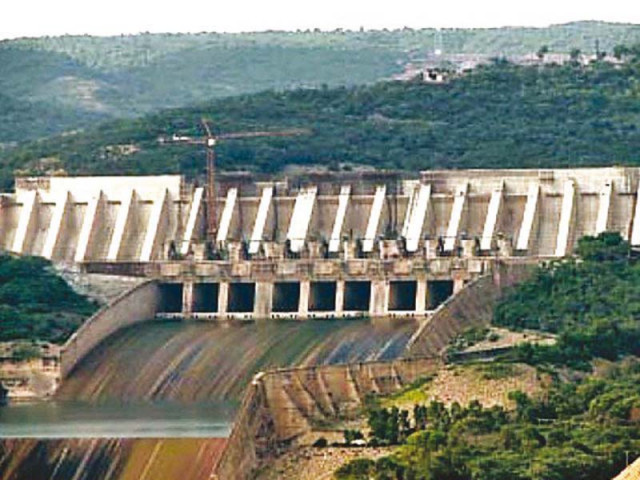Dasu hydro project to cost a whopping Rs1.74tr
ECNEC approves new border crossing post at Wagah

The government on Wednesday conditionally approved the construction of the Dasu hydropower project at a 240% higher cost of Rs1.74 trillion and also decided to build a new border crossing post at Wagah with India.
The Executive Committee of the National Economic Council (ECNEC), which took the decisions also approved the construction of 30 anti-smuggling posts along River Indus and in Balochistan at a cost of Rs15 billion.
Ecnec took up 10 projects for approval costing Rs2.1 trillion, including the construction of the Dasu hydropower project as an additional agenda item. Deputy Prime Minister Ishaq Dar chaired the executive committee meeting, which has the mandate to approve mega development schemes.
Ecnec conditionally approved the revised Dasu project at a record-breaking cost of Rs1.7 trillion or $6.2 billion. Last month, the Planning Minister had termed the cost an "astronomical increase" of 240%.
The conditional approval has been given for facilitating loan negotiations with foreign lenders. It was also decided that a helicopter will be procured under the Cabinet Secretary supervision for safe travel of Chinese contractors of the Dasu hydropower project. A Planning Commission's committee would still vet the project cost, according to the officials.
Compared to the original cost, there was a massive jump of Rs1.3 trillion in the hydropower project cost with the per-unit cost of the supposedly cheapest water-based power generation scheme now coming to Rs8.79. The original project cost was Rs479 billion.
In the Central Development Working Party meeting, Planning Minister Ahsan Iqbal termed had directed third-party validation of the astronomical increase in the revised PC-I.
Planning Minister Ahsan Iqbal on Wednesday did not comment on the questions about the approval of the Dasu hydropower project as an additional agenda item and construction of new border crossing with India.
The $6.2 billion cost of the project is now almost equal to the $6.7 billion cost of building a railway track from Karachi to Peshawar under the China-Pakistan Economic Corridor (CPEC).
The project had been planned to generate 2,160MW of electricity and the government now needs more foreign and local loans. Wapda was in negotiations with the World Bank for a whopping $1 billion new loan. The $1 billion loan will be a mix of expensive and concessional loans. The World Bank has already given a $517 million loan for the project.
The government will also get a $400 million foreign commercial loan by using World Bank guarantees. It will also search for Rs350 billion in domestic commercial loans.
The government had earlier ordered an inquiry to determine the reason for cost escalation but it did not fix the responsibility on any single entity or individual and pointed figures at Chinese contractors, Wapda and the Planning Commission.
The inquiry had also blamed the local administration of Kohistan district for a delay in land acquisition. It said that the cost was increased by Rs48 billion because of enhanced security arrangements after two deadly attacks on the Chinese contractors. The impact of security arrangement was hardly 3.8% in the total cost escalation.
The ECNEC approved the construction of a new border crossing at Wagah with India. The government is already implementing a project with the loan of the Development Bank to construct border crossing points along the Afghanistan border.
In July last year, the committee had decided that a similar post would also be built at a key crossing point with India, Wagah border. With a cost of Rs95.5 billion, two locations are already being constructed at Torkham and Chaman international borders.
The contract for the Wagah post will be given through competitive bidding, according to the decision.
Ecnec had asked the planning ministry to give its recommendation whether to build the Wagah border crossing site under the government deal or through international competitive bidding. The committee informed the ECNEC that the lessons learnt from the existing contract, documentary evidence provided by the FBR, comparative analysis on merits and demerits of open and the government-to-government contract, ADB's procurement regulation and Public Procurement Rules, it was advisable to give contract through competitive bidding.
Ecnec also approved the construction of 30 anti-smuggling checkpoints along River Indus, Hub and in Balochistan with a cost of nearly Rs15 billion. The Federal Board of Revenue admitted before the ECNEC that the conventional anti-smuggling methods have failed to yield results and the economy was sustaining Rs750 billion revenue losses due to smuggling.
The project aims to establish Digital and Mobile Enforcement Stations (DES), along with upgraded check-posts, to curb smuggling, enhance tax revenue, promote formal trade, and strengthen border security through technology-driven enforcement. The scope of work includes the development of 10 DES sites in Balochistan, along with 11 small, 6 mediums, and 3 large DES sites across designated locations.
ECNEC approved Sindh Flood Emergency Rehabilitation Project Phase-II at a cost of Rs12.2 billion. The Phase-II envisages restoration and rehabilitation of 146-kilometer long 19-roads in four-districts affected by the floods.
ECNEC approved a revised project for repair of 100 locomotives at a cost Rs16 billion. It also sanctioned a project in Khyber Pakhtunkhwa at the revised cost of Rs113 billion for the rural accessibility to markets, education and health facilities, through rehabilitation of the rural road network, measuring 878 km.
The Mangi Dam at Rs19 billion revised cost was approved. The main objective of the project is to reduce the existing shortfall in the water demand that is currently being faced by Quetta City. At present, the estimated availability of drinking water in Quetta valley is much less than the minimum 15 gallons per capita per day. Adopting a water consumption of 20 gallons per capita per day, the present water requirement of Quetta is estimated to be 40.9mgd (76.0 cusecs). The proposed Mangi Dam will enable a supply of 8.1 MGD (15.1 cusecs) to Quetta City.
ECNEC approved the project namely "Sindh Early Learning Enhancement Through Classroom Transformation" worth Rs46.6 billion. The project is proposed to be financed through the World Bank & Government of Sindh. Project aims to address critical supply-side gaps using a combination of results-based financing and traditional expenditure-based mechanisms to enhance school availability, teacher allocation, and learning outcomes across the province.
ECNEC also approved the 220kV Transmission System Network Reinforcement in Islamabad and Burhan Area worth Rs11.3 billion. The main objective of the project is to enhance the capacity of the national transmission system to remove the transmission constraints in order to meet the growing load demand of IESCO and also for reliable dispersal of upcoming generation from Tarbela 5th extension project.




















COMMENTS (4)
Comments are moderated and generally will be posted if they are on-topic and not abusive.
For more information, please see our Comments FAQ